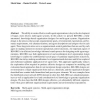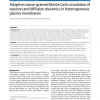5681 search results - page 1128 / 1137 » A Domain Model for eParticipation |
ECSA
2010
Springer
13 years 10 months ago
2010
Springer
In the software domain, self-adaptive systems are able to modify their behavior at run-time to respond to changes in the environment they run, to changes of the users' require...
AAMAS
2008
Springer
13 years 10 months ago
2008
Springer
The ability to create effective multi-agent organizations is key to the development of larger, more diverse multi-agent systems. In this article we present KB-ORG: a fully automate...
ARTMED
2008
13 years 10 months ago
2008
Objective: Cardiovascular disease, obesity, and lack of physical fitness are increasingly common and negatively affect people's health, requiring medical assistance and decre...
BMCBI
2010
13 years 10 months ago
2010
Background: An adaptive coarse-grained (kinetic) Monte Carlo (ACGMC) simulation framework is applied to reaction and diffusion dynamics in inhomogeneous domains. The presented mod...
BMCBI
2010
13 years 10 months ago
2010
Background: Biological networks offer us a new way to investigate the interactions among different components and address the biological system as a whole. In this paper, a revers...


